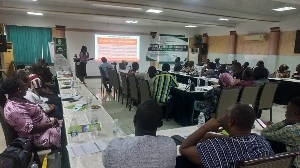 PFAG believes this will address the lack of adequate funding, lack of proper consultation
PFAG believes this will address the lack of adequate funding, lack of proper consultation
The Peasant Farmers Association of Ghana (PFAG) has called on government to employ the Labour Intensive Public Works (LIPW) approach for the construction and re-engineering of dams constructed under the One Village One Dam initiative (1V1D).
This approach will address the lack of adequate funding, lack of proper consultation and involvement of all relevant stakeholders, which has been associated with government’s One Village One Dam program.
This proposal was contained in a policy brief on the One Village One Dam submitted by PFAG to the Ministry of Food and Agriculture, during a national stakeholder’s meeting on Irrigation development. The workshop was organized as part of activities of PFAG, under the Sustainable Employment through Agribusiness (AgribiZ) program implemented by GIZ.
Sharing the findings on the research work carried out on two dams in the Upper East Region, the co-researcher Dr. Joan Akandi Atulley, revealed that, both dams suffers from structural defects that makes it difficult for farmers to use.
Citing the Vunania dam, the research uncovered high spillways, undulating embankment surface, leakages along the main pipeline, faulty valve at both the offtake and lateral chambers.
On the Gia Dug out, the lapses discovered include the inappropriate siting of the dams resulting in a shallow reservoir with limited storage, un-engineered embankment making the structures vulnerable to collapse and steep deep pits at the edge of the dam wall, exposing livestock to danger.
Overall, the execution of the Gia Dug out was classified as below standard and that public funds have not been used judiciously. The research further demonstrates the approaches used for the construction of the Gia Dug out reflects the state of most dams constructed under the 1V1D program.
The research therefore called for the utilization of the LIPW approach for the re-engineering of the dams under the 1V1D program. This approach will support the creation, rehabilitation, and maintenance of dams by community members and qualified engineers, with supervision from the Ghana Irrigation Development Authority. Moreover, due to the limited funds allocated for the construction of the dams, the LIPW approach will help to make judicious use of the scarce resources.
The research also called for the review of water management by-laws making them more biting to deter flaunters of the law. Moreover, post-construction analysis and evaluation should be compulsory before handing over projects to correct defects.
Mr. Martin Anyawomese, the Assemblyman for the Vunania Electoral area, was also critical of the work done so far on the Vunania dam, making it unfit for purpose. He iterated calls for the government to re-engineer the defects identified with the dams and correct them as soon as possible.